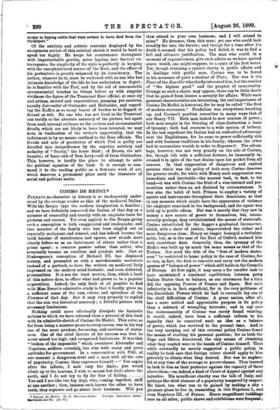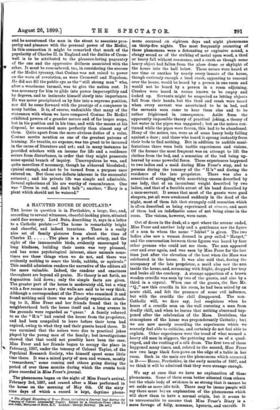COSIMO DE MEDICI.* PERHAPS no character in history is so
inadequately under- stood by the average reader as that of the medimval Italian. With the Borgia type the modern imagination is familiar ; and we have definitely conceived the Italian of that day as a monster of sensuality and cruelty with an exquisite taste for pictures and statues. Yet even applied to the Borgia group such a conception is both exaggerated and inadequate; and that member of the family who has been singled out as especially malignant and sensual, and has indeed become the lurid heroine of melodramas and operas, now stands more clearly before us as an instrument of others rather than a prime agent ; a creature passive rather than active, who eventually became an excellent and prudent wife. Just as Shakespeare's conception of Richard III. has displaced history, and presented us with a melodramatic caricature instead of a portrait, so have the writers on media:Tel Italy impressed on the modern mind fantastic, and even distorted, personalities. It is not the least service, then, which a book of this nature does, to efface what had grown to be a popular superstition. Indeed, the only fault at all possible to find with Miss Ewart's admirable study is that it hardly gives us, a sufficient sense of the zest, colonr, and splendour of the Florence of that day. But it may very properly be replied that the aim was historical accuracy ; a faithful picture with necessary limitations.
Nothing could more effectually dissipate the fantastic notions to which we have referred than a perusal of this book with its admirable sketch of Cosimo De Medici. This ruler, so far from being a monster prone to every excess, was in his way one of the most prudent, far-seeing, and cautions of states- men. One of the chief factors of his success was that he never aimed too high, and recognised limitations. It was that " beckon of the impossible " which overthrew Alexander and Napoleon, soldiers certainly, but also with many and great aptitudes for government. In a conversation with Pitti, at one moment a dangerous rival and a man with all the arts of popularity, Cosimo thus expresses himself :—" You aspire after the infinite, ;I seek only the finite; you would climb up to the heavens, I wish to mount but little above the earth, and I do not try to fly for fear of falling You and I are like two big dogs, who, coming together, sniff at one another ; then, because each knows the other to have teeth, they separate and go about their business. Will you • CoRim0 be Afedfri. By E. Dorothea Ewan. Foreign Statesmen Series/ Macnalllaz Anti Co. (24. Cd.] then attend to your own business ; and I will attend to mine? No dreamer, then, this man; yet one who could look steadily far into the future ; and though for a time after his death it seemed that his policy had failed, it was to find a full and ultimate justification. The man who could, in a moment of expansiveness, give such advice as we have quoted above would, one might suppose, be a cynic of the first water. Yet, though retaining a cynical clarity in public affairs and in dealings with public men, Cosimo was to be found in his moments of quiet a student of Plato. Nor was it the Plato of the Republic who chiefly interested him, but the teacher of "the highest good" and the prophet of immortality. Strange as such a choice may appear, there can be little doubt that he gained from leisure a serenity for affairs. While such personal characteristics are interesting, the real importance of Cosimo De Medici is historical, for he may be called "the first of modern statesmen." Feudalism was everywhere breaking up, and Cosimo's position resembles in many ways that of our Henry VII. Both men looked to new sources of power ; both men sought in the blurring of class-distinction a basis of tyranny ; both had recourse to a wide system of bribery. In the last expedient the Italian had an undoubted advantage over the Englishman, for he came to power sufficiently rich and with business traditions in his family, whereas the other had to accumulate wealth in order to dispense it. The advan- tage, however, was not very greatly on the side of Cosimo, for, though left with a sufficient fortune, he immensely in- creased it in spite of the vast drains upon his pocket from all sources. In that suppression of dangerous and exalted persons which was the policy of both men, Cosimo deserves the greater credit, for while with Henry such suppression was immediate and inevitable—the nearest task, in fact, to his hand—it was with Cosimo the fruit of a wise instinct and pre- monition rather than an act dictated by circumstances. It was also the habit of both Princes to employ a variety of agents and instruments throughout their dominions, so that in any measure which might have the appearance of violence the employer remained in the background, and the agent was held up to public odium. Nor was it merely that they saw in money a new source of power to themselves, but, uncon- sciously perhaps, they revolutionised the means of statecraft. Cosimo substituted for the dagger a graduated Income-tax, which, with a show of justice, impoverished the richer and more dangerous class ; Henry no longer besieged a turbulent noble, but, as in the case of the Earl of Oxford, maimed him with exorbitant fines. Generally, then, the tyranny of the Medici was built up by much the same means as that of the Tudors. Nor need the title of the "first of modern states- men " be restricted to home policy in the case of Cosimo, for he was, in fact, the first to conceive and carry out the modern system of " balance of power " which still holds in the Councils of Europe. At first sight, it may seem a far smaller task to have maintained a continual equilibrium between petty Italian States than to balance, as our statesmen for a time did, the opposing Powers of France and Spain. But such inferiority is, in fact, superficial, for in the very pettiness of the discordant Powers which he had to reconcile lay one of the chief difficulties of Cosimo. A great nation, after al], has a more settled and appreciable purpose in its policy than a network of wrangling interests ; and in any case the statesmanship of Cosimo was rarely found wanting. It would, indeed, have been a sufficient tribute to his sagacity that he conceived such an idea as a balance of power, which has survived to the present time. And in the very carrying out of this external policy Cosimo found the means of exalting his personal position; for as both the Pope and Sforza discovered, the only means of obtaining what they wanted were in the hands of Cosimo himself. Thus while outwardly he merely suggested a public policy, in reality he took care that foreign rulers should apply to him privately to obtain what they desired. Nor was he neglect. ful at any time of the average or poorer classes. They learned to look to him as their protector against the rapacity of those above them,—as, indeed, a kind of Court of Appeal against any injustice. His munificent charity was the talk of Italy, and perhaps the chief element of a popularity tempered by respect. He knew, too, what was to be gained by making a city a pleasant place to live in, resembling in this Napoleon L, and even Napoleon III., of France. Hence magnificent buildings rose on all sides; public shows and exhibitions were frequent;
and he accustomed the man in the street to associate pros- perity and pleasure with the personal power of the Medici. In this connection it might he remarked that much of the popularity of Charles II. in England and the dislike of Crom- well is to be attributed to the pleasure-loving pageantry of the one and the oppressive dullness associated with the other. It must be remembered, too, in considering the success of the Medici tyranny, that Cosimo was not raised to power on the wave of revolution, as were Cromwell and Napoleon. He did not fill the public eye as the " still strong man" who, after a wearisome turmoil, was to give the nation rest. It was necessary for him to glide into power imperceptibly and by degrees, and to insinuate himself slowly into importance. He was never precipitated as by fate into a supreme position, nor did he come forward with the prestige of a conqueror in many battles. It is, of course, undeniable that many of the statesmen with whom we have compared Cosimo De Medici exhibited powers of a grander nature and of far larger scope, but in his position and in his time, and with the means at his disposal, he succeeded more perfectly than almost any of them. Quite apart from the more obvious duties of a ruler, Cosimo merits mention as one of the greatest patrons of learning. No trouble, no expense, was too great to be incurred in the cause of literature and art; and in many instances he provided scholars with an income for life and a residence secure from disturbance, in order that they might prosecute some special branch of inquiry. Unscrupulous he was, and quite merciless if necessary, though he abhorred bloodshed; cynical enough, and not to be turned from a purpose once entered on. But these are defects inherent in the successful autocrat ; and his private life was simple and admirable. Several aphorisms of his are worthy of remembrance. One was " Dress in red, and don't talk "; another, " Envy is a plant which should not be watered."



































 Previous page
Previous page